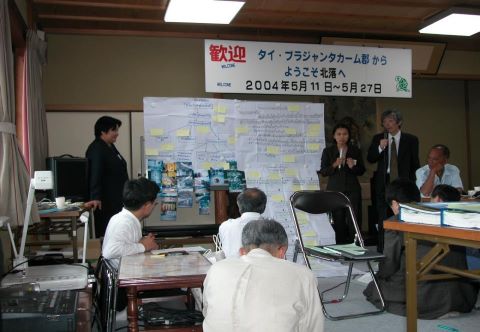International Cooperation and Japan’s Local Innovation : (1) Connection between “International” and “Local”
2023.09.04
-

- Kimata Yoichiro Representing Director for Eastern Hokkaido JICA Hokkaido (Obihiro)
You may think the "International Development Cooperation" and "Japan’s Local Innovation" are completely different initiatives. Nevertheless, these two are actually connected.
It has been almost 50 years since JICA was established in 1974. Over the years, the issues of the developing countries to whom JICA has been cooperating have been changed significantly.
The word of “developing countries” may remind you “population explosion”. Nevertheless, some Southeast Asian countries have already faced the challenges of low birthrate and aging population. What’s more, rural areas in many developing countries are challenging against depopulation despite the populations are growing countrywide because a number of people from the rural areas flow into the cities. Even in Bhutan, a country known as the 'Land of Happiness,' we have witnessed an unexpected sight: over the past decade or so, the population has become increasingly concentrated in the capital, resulting in traffic jams. At the same time, depopulation has advanced in the countryside and abandoned farmlands can be seen here and there. These realities call into question the social and economic conditions that make the rural areas self-reliant and sustainable to achieve balanced development as a country.

For Japan, the international development cooperation in the future will require not only Japan's "knowledge from the past experience" but also "responding to challenges that are ongoing" at the local level.
There are global challenges such as the SDGs, that has become an everyday topic in Japan in recent years, that call for global action from developed countries including Japan as well as developing countries.
A challenge which seems to matter developing countries only; however, it calls for global action to involve developed countries in many ways. We are encouraged to take these issues “our own concerns” to respond. Our usual practices could be realized to connect to truly global initiatives by connecting local practices in Japan and those in developing countries.
More and more challenges and initiatives in developing countries can be linked to those in Japan’s rural areas. In such a backdrop, more 'outsiders' want to get involved in local and community development, whether in Japan or in developing countries. For overseas, JICA dispatches JICA Overseas Cooperation Volunteers (JOCV) to developing countries. For domestically, there is the Community-Reactivating Cooperator Squad (CRCS). Interestingly, some former JOCV members have become CRCSs, while other JOCV returnees are active as social entrepreneurs themselves. For them, it doesn’t matter which entry point comes first to get involved with community development. There are fundamental differences in their actual situations and positions. Nevertheless, regardless of the countries and regions they are assigned, it is common that they try to help the communities revitalize themselves through making the most of the resources in the communities as well as connecting various people from inside and outside the community.
"I never thought that our regional development can be connected to the distant country!" This is the common impression of the volunteers who are working steadily, deeply involved in the rural communities in Japan. Moreover, such regional development efforts reward greatly to the volunteers by giving confidence, excitement, and discoveries when they have found common aspects with overseas through “international cooperation.” This kind of cross-border inter-region matching would be recognized as the most valuable for JICA.
I would like to introduce one example that JICA Hokkaido (Obihiro), where I work, is implementing.
Shihoro Town, which is about 40 minutes by car from Obihiro, has decided to exchange with Kyrgyz Republic, a Central Asian country. Both Obihiro Town and Kyrgyz Republic have a common specialty called "seaberry." The seaberry is dubbed "miracle fruit" and is attracting attention as a health food that is effective in preventing anemia and it helps recover from fatigue. Shihoro High School is a town-run agricultural high school. Teaming up with local businesses, the high school has developed unique products using local agricultural products that are popular at local roadside car stations. To apply such joint product development efforts between local high school students and businesses into Kyrgyz Republic colleges (vocational schools), they have implemented JICA Partnership Program. Last year, a teacher from Kyrgyz Republic visited Shihoro High School to see the initiatives. This year, at each school in both countries, the students are developing products to turn the sea berries’ peels, that are usually thrown away after squeezing the juice, into paste and powder. The students are competing with each other while exchanging information on the process through online.


In October this year, college students from Kyrgyz Republic are scheduled to visit Japan. It will be a wonderful program where young people from Japan and Kyrgyz Republic interact and cooperate directly with their skills and initiatives. If product developments of both parties will go well, they will exhibit the products in a new product competition to be held in Kyrgyz Republic in early next year. Our dream is growing: one day, the products developed by students from Shihoro Town and Kyrgyz Republic will be on display at the roadside stations, creating a buzz and attracting many visitors to Shihoro Town.
In the coming era, the challenges of developing countries and Japan will become even closer. In this context, international cooperation will have the meaning of creating and promoting a new global society that will include not only developing countries but also Japan, by linking the issues of both developing countries and Japan, as well as regional efforts to address them. (To be continued to (2))

International Cooperation and Japan’s Local Innovation: (4) A New Era of International Cooperation Co-Created from Local Innovation

International Cooperation and Japan’s Local Innovation : (3) Lessons Learned at the sites striving for Revival from Great East Japan Earthquake

International Cooperation and Japan’s Local Innovation : (2) A Global Bond Born Two Decades Ago
scroll